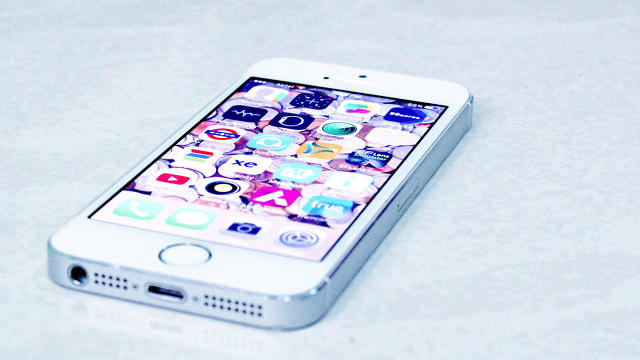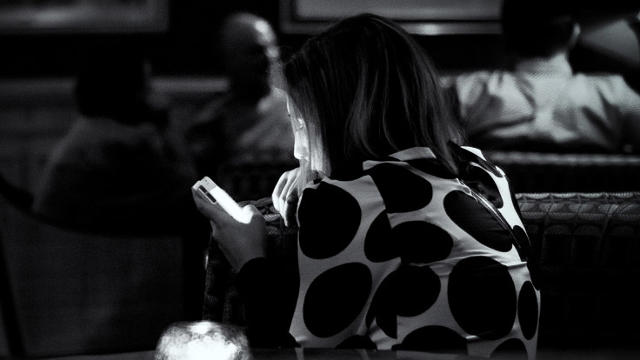It took me 10 minutes to write this first sentence. Why? Because as I sat down to write this story and while I tried to think of how to open it I checked my iPhone eight times. Some of those times were for simple procrastinations such as checking the news, some were for app notifications, and one was actually for a phone call (one of the less common utilities people use their smartphones for).
Aptly, this example personifies the exact reason I chose to undertake the research needed to write this article: I’m addicted to my smartphone and wanted to see what my life would be like for one week without it. And that addiction I have to my smartphone? I’m not alone. Collectively, Americans check their smartphones 8 billion times a day, notes Time. Statistically, that means each of you reading this will check your smartphone 46 times per day (up from 33 times per day in 2014). And it’s worse for users in the U.K. There a study by Nottingham Trent University that found adults ages 18-33 checked their smartphones 85 times a day, or once every 10 minutes—and they don’t even know they are doing it.
Yet all this interaction wouldn’t be a bad thing if it didn’t have negative consequences. But it does. Besides increased screen time messing with our sleep, smartphone use also has other health-related side effects such as causing or exacerbating depression and anxiety. And that’s nothing to say of the fact that sometimes our smartphones distract us so much they lead to death. I know I’ve almost been hit by a car walking through London more than once because I stupidly became so distracted with my iPhone I ceased paying attention to my surroundings.
But despite knowing it’s a bad habit, when my editor suggested a piece on giving up my smartphone for a week I was apprehensive. Could I do it? One survey showed that 84% of respondents said they couldn’t even give up their smartphone for a single day, yet alone a week. But I wanted to find out. So for one week I turned my iPhone into a “dumb phone”–removing all apps from it, turning off the Wi-Fi, and only using the phone call and text message features. Here’s what I experienced:

I Felt Cut Off
I honestly didn’t know what to expect giving up the smartphone functions of my iPhone. I was a teenager in the ’90s when we made do with pagers. This was years before any kind of mobile phone became affordable—or the norm. So you’d think giving up my smartphone wouldn’t be that big of a deal to me. I’d survived in the past; I’d survive now, right?
I won’t lie: The first few days I felt very isolated. I had suddenly given up the primary communication tool that most of modern society uses. Suddenly I didn’t have access to the latest news or local weather forecast. I’m in London—how will I know if it’s going to rain in a few hours (Look up into the sky? Please.)? But worse than being cut off from breaking events, I felt isolated from my friends and family.
When you give up your smartphone it becomes painfully obvious just how much personal communication and contact is done via modern messaging apps like Facebook Messenger and WhatsApp. But more than that, I felt I was missing out on my friends’ lives. I no longer had access to their Facebook feeds or Instagram posts. And I couldn’t immediately share tidbits about my life with them. Plus, I actually missed a gathering with friends, which was spontaneously assembled one afternoon. They organized the event on Facebook and when I didn’t reply to the invite no one thought to call or text me to see if I was coming because of course I had been notified of the event invite by my Facebook app.
I Worried My Work Would Suffer
By midweek I also started getting paranoid my work would suffer. As a journalist I probably use Twitter for work more than most users do: checking breaking news, tweeting articles, finding sources. During the day I actually was nervous to leave my computer—my only link with the Internet—and journey into the world without it, lest I miss some big news when I’m out. And though my colleagues at Fast Company knew I was undertaking this experiment and might not be available as much because of it, I felt bad not being able to reply to Slack messages, sent hours before, until I was at a computer again.

I Realized How Much I Use My Smartphone For
Needless to say, in the first three or so days, it became readily apparent how beneficial smartphones are. You’re really never lost with one—whether metaphorically, by seeking information, or literally, by finding your way with GPS and maps. Case in point: I’ve lived in London almost 10 years. It’s a massive metropolis that has come to feel smaller because I can pull out Google Maps at any time and find a point of interest or directions to a place with ease. Not so when I gave up my smartphone. I really missed the ability to know where, precisely, I was in the world at any given time.
I also realized how beneficial recent advancements in smartphone technology are—like Apple Pay. Now that I didn’t have access to contactless payments…buying anything just felt like it took forever. Speaking of which, I needed to buy physical bus and tube tickets since I couldn’t use the contactless payment capabilities of my smartphone. Last annoyance: I actually carried around more devices. Since I couldn’t use the music player features of my iPhone I needed to take an old iPod shuffle with me on my walks in the park.
I Felt More Anxious…Then Relieved
As you might guess from my observations above, the feelings of isolation from news and friends and other information made me feel anxious during the first half of the week. Was I missing out on something? What if I didn’t have access to information when I needed it? But then, about halfway through the week, things started to change. Instead of anxiety, when I left the house without my smartphone features, I started actually feeling relief.
Was I really isolated? Or was I just taking back control over my life—choosing who or what could reach me when? After you get through the withdrawals of not being bombarded by email alerts, tweets, and Slack messages you come to appreciate this lack of easy access others have to you. Oh, you needed that from me? Sorry, I obviously had no idea since I was away from my computer and focusing on things important to me. This turning of the corner from anxiety to relief made me realize I have more control over who I choose to interact with—or be bothered by—without my smartphone.

I Started Interacting More With People IRL
Oddly enough, by the final few days I started interacting more with real people than I normally did. Sure, some of this was out of necessity. I actually had to call the operator to find the number of a local business to get their address. But there were other times I also found myself striking up conversations with people I normally never would. Like the girl in line at the market—normally I’d distract myself with my iPhone when standing in any line, but now that that wasn’t an option I took the risk of having some nice small talk with a complete stranger and it was lovely.
I Fell In Love With Newspapers Again
No smartphone meant no games to play or newsfeed to read on my commutes. That meant I’d need to get reacquainted with the free daily papers handed out at tube stations. In the past I had tended to avoid these papers because they obviously did not have the latest news—like my Twitter app did. A paper handed out at 6 p.m. would have been written and printed no later than noon that day. But now forced to read these papers, I realize that most people don’t need the latest breaking news because—on digital platforms—the headline that begins with “BREAKING” is used too loosely and too frequently. Most news just isn’t something you need to know about that minute.
I also realized why I used to love newspapers so much: because newspapers are a finite medium. Articles are often more concise and to the point. Plus you can’t continue reading endlessly from one article to the next ad infinitum. Reading a newspaper and being able to finish it makes you feel like you’ve accomplished something. You can never finish reading the Internet.
My Mind Was Free To Wander Again
But the biggest thing I noticed by the end of the week was that my mind was free to wander again. As a writer and journalist, that’s a great thing. That’s where grand ideas come from. The ability to let the mind wander is a natural freedom we are born with that modern technology seems to intent on stomping out with all the pings and notifications and distractions our smartphones bring us.
The greatest writings and art and discoveries are most often the result of their authors embracing that glorious free flow of undistracted thought in their heads, and it’s a relief to know that that inborn freedom is willing and able to come back into your life if you let it.

But In The End I Was Glad To Have My Smartphone Back
Given my last few observations, you may be a bit surprised to hear me say that after the seventh day when I could turn my iPhone back into a smartphone I was glad to have it back. But I was. Being without it for a week made me realize just how important a tool it is in modern society–and it will only become more useful. Right now my iPhone is literally everything from being the gateway to unlimited information, to being my wallet and my bus tickets, to my lifeline to keeping me up to date on what my family and friends are doing, even if they are thousands of miles away.
The smartphone not only makes my life easier, it makes the world smaller and more surmountable. Matter of fact, when history looks back on our time, the smartphone will probably be labeled a more important device than the PC. And it’s only going to get more useful. Another thing I missed was having the ability to see exactly how many miles I walked each day. In the years to come our smartphones will even be more integrated with our personal health and could even become a literal lifesaver.
I know that smartphones don’t only add to our quality of life, but giving it up for a week hasn’t cured my addiction. I still check it too often. But the key for me at least is not to go back to a time when smartphones weren’t a big part of our lives. They key is moderating notifications, and setting boundaries. It’s knowing when to put your smartphone down and take advantage of the glorious real world around you. And that’s something I still need to work on.
Editor’s Note: I assigned this article in part because I live completely without a smartphone. Read about what it’s like here.
Is being too connected ruining your productivity?
Fast Company , Read Full Story
(31)